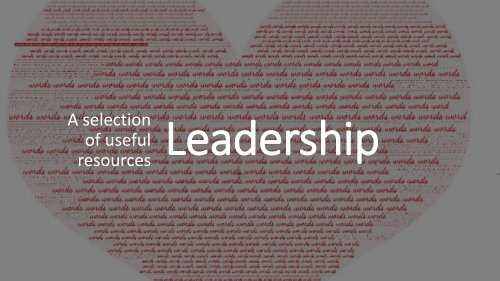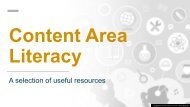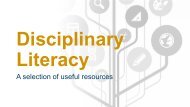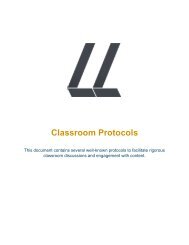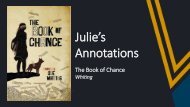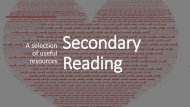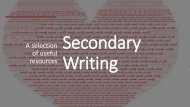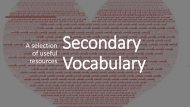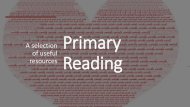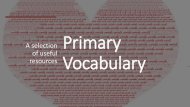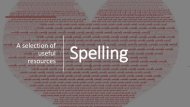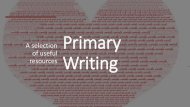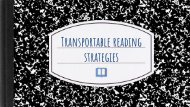You also want an ePaper? Increase the reach of your titles
YUMPU automatically turns print PDFs into web optimized ePapers that Google loves.
A selection<br />
of useful<br />
resources<br />
<strong>Leadership</strong>
Coherence<br />
Fullan & Quinn (2016)<br />
Fullan and Quinn present the Coherence<br />
Framework as the key to sustainable and<br />
successful change. The framework is a dynamic<br />
customisable roadmap made up of four essential<br />
components. The text provides insights and tools<br />
to drive effective leadership and moves the<br />
narrative of fixing one teacher at a time to asking<br />
about the coherence of a system, be it a school<br />
or broader system. It shows examples of<br />
coherence in action and makes no excuses for<br />
employing the wrong drivers of change.
Focus<br />
Schmoker (2018)<br />
In this second edition, Mike Schmoker<br />
argues that schools are yet to focus their<br />
time and energy on the most essential,<br />
widely acknowledged, evidence-based<br />
practices that could have more impact than<br />
all other initiatives combined. These are<br />
simple, coherent curricula; straightforward,<br />
traditional literacy practices; and lessons<br />
built around just a few hugely effective<br />
elements of good teaching.
Disciplinary Literacy<br />
Inquiry & Instruction<br />
The authors share their experiences of working<br />
for many decades with teachers across grade<br />
levels, conducting studies and analysing<br />
research in order to build a more<br />
comprehensive instructional framework that<br />
engages students in every content area. They<br />
present a Disciplinary Literacy approach where<br />
educators are asked to empower students to<br />
adopt and eventually adapt the language,<br />
genres, and modalities prized by each discipline.<br />
Ippolitoo, Dobbs & Charner-Laird (2019)
Leading Change in Your<br />
School<br />
Reeves presents the conditions that need to<br />
be created in schools for change. He shares<br />
what he has learned through his work with<br />
educators in thousands of schools around<br />
the world and presents real-life examples of<br />
leaders who have met the challenge of<br />
change head-on with impressive results.<br />
Readers will also find practical resources for<br />
engaging their colleagues in change<br />
initiatives.<br />
Reeves (2009)
Clarity: What Matters Most<br />
in Learning, and Leading<br />
In this text, Clarity: What Matters Most in<br />
Learning, Teaching, and Leading - Sharratt<br />
illustrates how system and school leaders<br />
must come together to boost student<br />
achievement and build teacher capacity to<br />
learn, teach and lead. Readers will uncover<br />
14 essential Parameters to guide system<br />
and school leaders towards building<br />
collaborative learning cultures.<br />
Sharratt (2019)
Best Practices of Literacy<br />
Leaders: Keys to School<br />
Improvement<br />
This book presents the principles of<br />
effective literacy leadership and describes<br />
proven methods for improving<br />
instruction, assessment, and school-wide<br />
professional development. It explains the<br />
key roles of formal and informal leaders in<br />
initiating, supporting, and sustaining<br />
instructional improvement.<br />
Swan & Bean (2020)
How to Get your School<br />
Moving and Improving<br />
This text is based on over three decades of<br />
research by Professor Steve Dinham. It<br />
covers all aspects of teaching, learning and<br />
school leadership. It shows what research<br />
has revealed about what really works and<br />
adds value in Australian schools in the<br />
twenty-first century.<br />
Dinham (2008)
Deep Learning: Engage the<br />
World Change the World<br />
This book states the moral imperative that<br />
educators have when teaching so that<br />
students will have enviable futures. It<br />
defines what deep learning is and takes up<br />
the question of how to mobilise complex,<br />
whole system change that transforms<br />
learning for all students..<br />
By: Fullan, Quinn & McEachen (2018)


